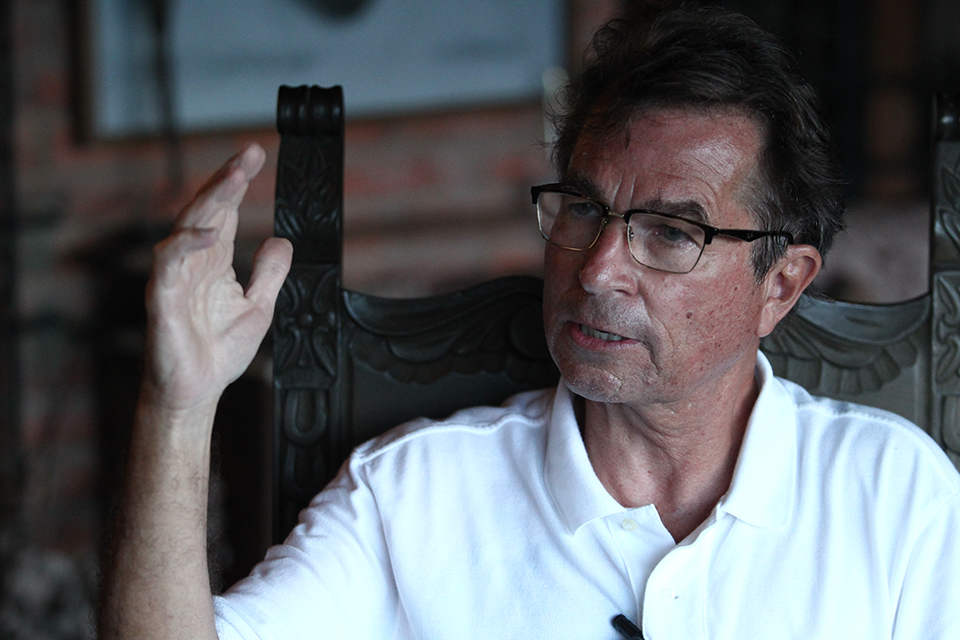Starbucks made in El Salvador

The Salvadoran coffee you can find in Starbucks around the world comes from the Montecarlos farm. Managed by Carlos Batres Bendix, its history is mixed with the history of the coffee industry in El Salvador. Today it produces 10,000 quintals a year (1,000 tons) and one of the most special varieties of coffee, Pacamara. It provides this flavor to Starbucks shops around the world, more specifically to Japan, Europe and the United States. In this interview, he talks about the opportunity the country has today to re-grow in the world coffee market.
How did you become a global supplier of Starbucks?
Our farm is exceptional because it is a volcano turned into a coffee farm. This makes it quite unique worldwide, due to its topography and altitude. Another characteristic of the Montecarlos farm is that the Pacamara variety was grown commercially here for the first time. Pacamara is a hybrid between the Pacas variety - a mutation of Bourbon - with the Maragogype variety, which comes from Brazil, and it was developed at the time by the Salvadoran Coffee Institute. The specialty coffee market was born in 1999, when the first Cup of Excellence contest was held in Brazil. The Cup of Excellence is a contest that was born thanks to the United Nations and the World Bank, to promote coffee and revive this industry worldwide. Before, everything was a commodity and therefore coffee was not profitable as international prices were excessively low. The Pacamara variety was the only one that got an award, and thanks to the fact that this farm was the first to cultivate it commercially, we got international relevance. I had a good relationship with the Starbucks shoppers, they liked the farm's typeface and were impressed with the Pacamara. In 2004, Starbucks started with a promotion called Black Apron, through which they launched the best coffees. For the first time, the Pacamara variety was presented to the specialty coffee market worldwide.
Why did the El Salvador coffee industry lose its leadership and high production levels?
It is a sad story. El Salvador was at one time the fifth largest coffee producers in the world. They were 5 million quintals (500 thousand tons) at the peak of production. But in 1979 we had a coup d'état that destabilized politics, the economy and consequently coffee production. The investment stopped and the market began to decline. In addition to the political issue, the fundamental reason why investment stopped was because the export of coffee was nationalized. From 1980 to 1989 an international agreement launched a system of quotas, through which the supply was limited to maintain a relatively high price. El Salvador was so convulsed that it could not benefit from the good prices generated by this agreement. When in 1989 the situation in the country began to normalize with the Peace Accords, the international quota system ended, and the price dropped a lot. All these factors caused the coffee industry in El Salvador to practically abandon itself.
And which is the situation now?
Luckily, the specialty coffee movement emerged in 2000. It is a movement towards coffee quality, it's a rebirth. This is a movement that, thanks to Starbucks, is widespread in Italy, the United States, and then came the proliferation of coffee bars. In this business we are going to have a specialty coffee segment, where El Salvador can have a place because it has a lot of potential. For specialty coffee, basically, you need three elements: variety, which has to be a good one; ground, and El Salvador, being volcanic land, definitely has one; and height, thanks to volcanoes and mountains. Specialty coffee can be grown from 1,400 meters up. These are the two elements that El Salvador could exploit to reactivate its coffee growing. There is potential. El Salvador has practically 400 thousand acres, 200 thousand abandoned coffee blocks. All you must do is plant again. With a billion dollars, the entire coffee area of the country could be replanted.
Is it possible to win in quality and quantity?
You can do both. One third of El Salvador's coffee park is above 1,400 meters, where good quality coffee is produced, special coffee. Further down, you can grow coffees that don't qualify as specialty, but could qualify as strictly high roast, high roast, or central standards coffees, that are not specialty, but better than the average.


